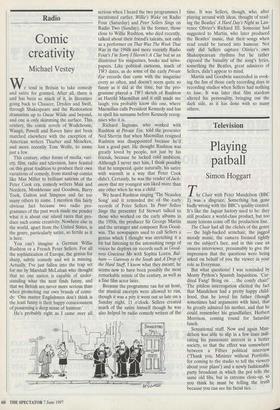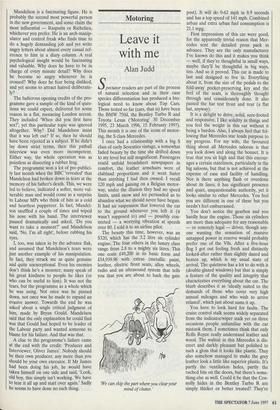Television
Playing patball
Simon Hoggart
Le Chair with Peter Mandelson (BBC 2) was a disgrace. Something has gone badly wrong with the BBC's quality control. It's like the Jaguar factory used to be: they still produce a world-class product, but too many lemons come off the production line.
The Chair had all the clichés of the genre — the high-backed armchair, the jagged moody music, the camera focused tightly on the subject's face, and in this case an unseen interviewer, presumably to give the impression that the questions were being asked on behalf of you the viewer in your role as Everyman.
But what questions! I was reminded by Monty Python's Spanish Inquisition. 'Car- dinal Fang! Bring on. . . the comfy chair!' The pitiless interrogation elicited the fact that Mandelson had a pretty happy child- hood, that he loved his father (though sometimes had arguments with him), that he greatly admired his mother, and that he could remember his grandfather, Herbert Morrison, coming round for Saturday lunch.
Sensational stuff. Now and again Man- delson was able to slip in a few lines indi- cating his passionate interest in a better society, so that the effect was somewhere between a Fifties political interview (`Thank you, Minister without Portfolio, for coming to the studio to tell the viewers about your plans') and a newly fashionable party broadcast in which the pol tells the same old fibs, but in extreme close-up, so you think he must be telling the truth because you can see his facial tics. Mandelson is a fascinating figure. He is probably the second most powerful person in the new government, and some claim the most influential — Rasputin or Richelieu, whichever you prefer. He is an arch-manip- ulator and control freak who finds time to do a hugely demanding job and yet write angry letters about almost every casual ref- erence to him in a diary column. A real psychological insight would be fascinating and valuable. Why does he have to be in charge of every minute detail? Why does he become so angry whenever he is crossed? Why does he fear being disliked, and yet seems to attract hatred deliberate- ly?
The ludicrous opening credits of the pro- gramme gave a sample of the kind of ques- tions we could expect, delivered for some reason in a flat, menacing London accent. They included 'When did you first have sex?', yet this particular topic was ignored altogether. Why? Did Mandelson insist that it was left out? If so, then he should have been rejected as a subject. If he didn't lay down strict terms, then this patball interview was even more incompetent. Either way, the whole operation was as pointless as dissecting a rubber frog.
The programme won a lot of pre-publici- ty last month when the BBC 'revealed' that Mandelson had broken down in tears at the memory of his father's death. This, we were led to believe, indicated a softer, more vul- nerable man and would come as a surprise to Labour MPs who think of him as a cold and heartless puppeteer. In fact, Mandel- son snuffled a couple of times and wiped his nose with his hand. The interviewer paused dramatically and asked, 'Do you want to take a moment?' and Mandelson said, 'No, I'm all right', before rubbing his eyes.
I, too, was taken in by the advance flak, and assumed that Mandelson's tears were just another example of his manipulation. In fact, they struck me as quite genuine and quite unexceptional. Even his enemies don't think he's a monster; many speak of his great kindness to people he likes (or who can be useful to him). It was not the tears, but the programme as a whole which he was using. Not once was he pinned down, not once was he made to expand an evasive answer. Towards the end he was asked about a single critical judgment of him, made by Bryan Gould. Mandelson said that the only explanation he could find was that Gould had hoped to be leader of the Labour party and wanted someone to blame for his failure. And that was that.
A clue to the programme's failure came at the end with the credit: 'Producer and Interviewer, Oliver James'. Nobody should be their own producer, any more than you Should be your own executor. If Mr James had been doing his job, he would have taken himself on one side and said, 'Look, old boy, this simply isn't working. We have to tear it all up and start over again.' Sadly he seems to have done no such thing.











































































 Previous page
Previous page